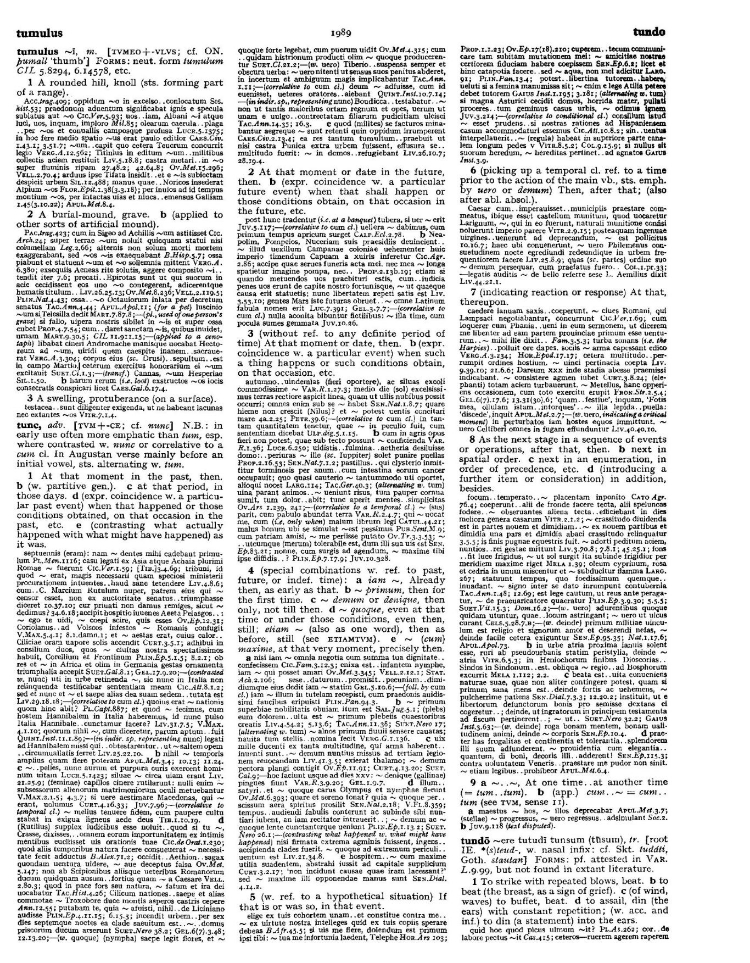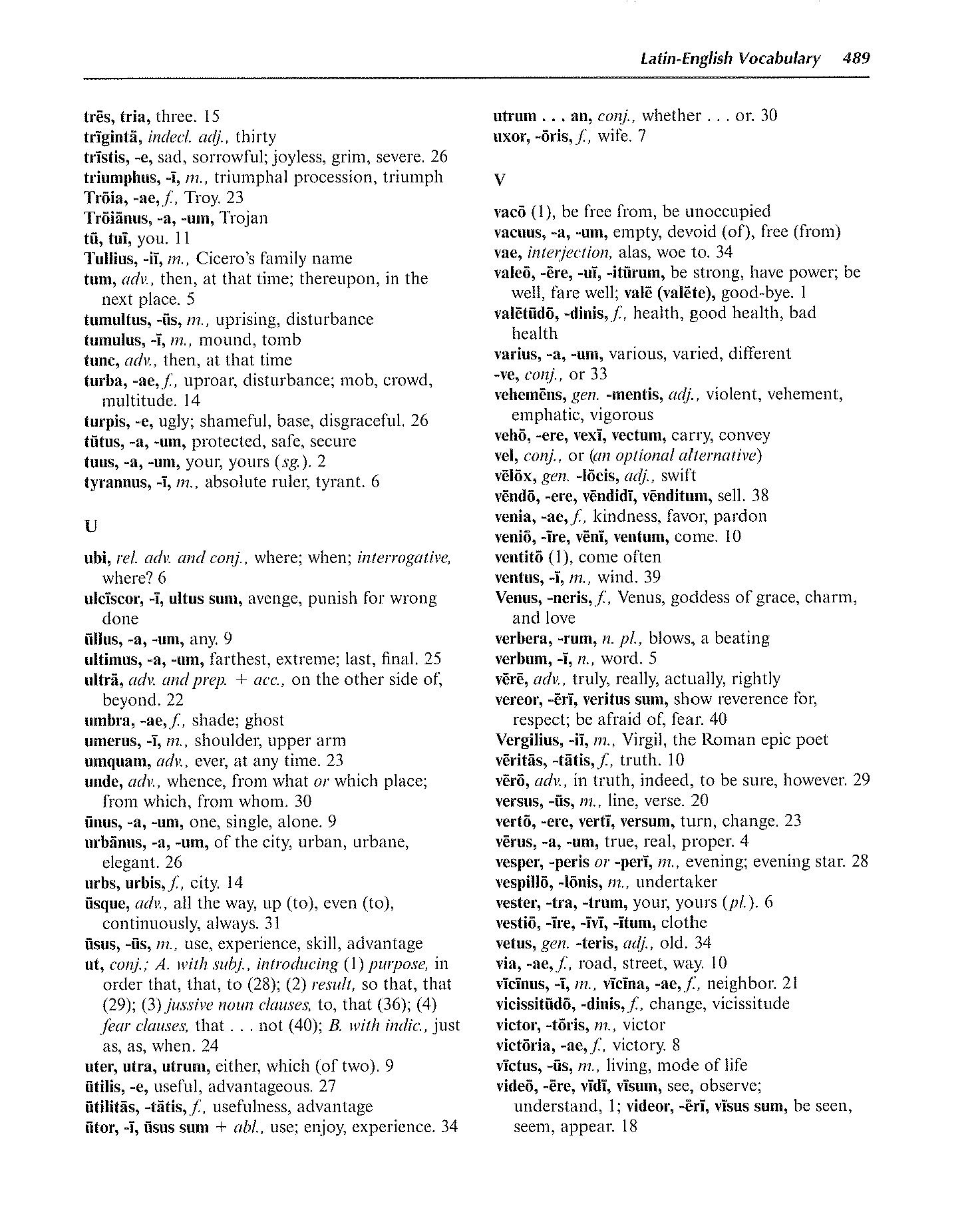
page_listing.tpl
page_subListingDetails.tpl
sub_listingDetails_style1.tpl
sub_listingDetails.title.tpl
tunc Then
tunc is a Latin Adverb that primarily means Then.
Definitions for tunc
Wheelock's Latin
Adverb
- 1
then, at that time
Oxford Latin Dictionary
Adverb
- 1
At that moment in the past, then. (b) (w. partitive gen.). (c) at that period, in those days. (d) (expr. coincidence w. a particular past event) when that happened or those conditions obtained, on that occasion in the past, etc. (e) (contrasting what actually happened with what might have happened) as it was.
- 2
At that moment or date in the future, then. (b) (expr. coincidence w. a particular future event) when that shall happen or those conditions obtain, on that occasion in the future, etc.
Sentences with tunc
Latin to English
Marcet sine adversario virtus; tunc apparet quanta sit quantumque polleat, cum qui possit patientia ostendit. [De Providentia, II, 4]Compare Without an adversary prowess shrivels. We see how great and efficient it really is only when it shows by endurance what it is capable of. [Tr. J. W. Basore]
Quam multa animalia hoc primum cognovimus saeculo, quam multa negotia ne hoc quidem! Multa venientis aevi populus ignota nobis sciet; multa saeculis tunc futuris cum memoria nostri exoleverit resevantur. Pusilla res mundus est, nisi in illo quod quaertat omnis mundus habeat.Compare How many animals we have come to know for the first time in our own days! Many, too, that are unknown to us, the people of a coming day will know. Many discoveries are reserved for the ages to be, when our memory shall have perished. The world would be a puny thing if future ages found in it nothing to investigate.
Mulier saevissima tunc est, cum stimulos odio pudor admovet.Compare A woman is never more ruthless than when shame gives a spur to her hatred.
Miles tunc iusiurandum adigo iussu consul convenio, neque iniussu abeo.Compare Then the soldiers were bound by an oath, that they would assemble at the order of the consul, and not separate without his orders.
Data sources
Notes
- Definitions
- Frederick M. Wheelock, Wheelock's Latin, 6th ed., rev. Richard A. LaFleur (New York, NY: HarperCollins Publishers, 2005): 489.
- P. G. W. Glare, Oxford Latin Dictionary, Vols. 1-8 (Oxford: Clarendon Press, 1982): 1989.
- Word frequencies
- Christopher Francese, "Latin Core Vocabulary," Dickinson College Commentaries, last modified 2014, http://dcc.dickinson.edu.
- Paul B. Diederich, The Frequency of Latin Words and Their Endings, PhD diss., (Columbia University, 1939).
- Louis Delatte, Suzanne Govaerts, Joseph Denooz, and Etienne Evrard, Dictionnaire fréquentiel et index inverse de la langue latine [Frequency Dictionary and Inverse Index of the Latin Language] (Liège, Belgium: Laboratoire d'analyse statistique des langues anciennes de l'Université de Liège [L.A.S.L.A.], 1981): 121.
Bibliography
Allen, Joseph H. Allen and Greenough's New Latin Grammar for Schools and Colleges: Founded on Comparative Grammar. Edited by James B. Greenough, George L. Kittredge, Albert A. Howard, and Benjamin L. D'Ooge. Boston, MA: Ginn & Company, 1903.
Crystal, David. A Dictionary of Linguistics and Phonetics. 6th ed. Oxford, UK: Blackwell Publishing, 2008.
Delatte, Louis, Suzanne Govaerts, Joseph Denooz, and Etienne Evrard. Dictionnaire fréquentiel et index inverse de la langue latine [Frequency Dictionary and Inverse Index of the Latin Language]. Liège, Belgium: Laboratoire d'analyse statistique des langues anciennes de l'Université de Liège (L.A.S.L.A.), 1981.
Diederich, Paul B. The Frequency of Latin Words and Their Endings. PhD diss., Columbia University, 1939.
Francese, Christopher. "Latin Core Vocabulary." Dickinson College Commentaries. Last modified 2014. http://dcc.dickinson.edu/latin-vocabulary-list.
Gildersleeve, Basil L., and Gonzales Lodge. Gildersleeve's Latin Grammar: Third Edition, Revised, and Enlarged. 3rd ed. London, England: Macmillan and Co., 1903.
Glare, Peter G.W. Oxford Latin Dictionary. Vols. 1-8. Oxford, England: Clarendon Press, 1982.
Krüger, Bernd. "Latin Conjugation Tables." Cactus2000. Accessed May 5, 2023. https://latin.cactus2000.de/index.en.php.
Pierson, Nick. "Sound of Text." Accessed October 26, 2019. https://soundoftext.com.
Wheelock, Frederick M. Wheelock's Latin. 6th ed. Revised by Richard A. LaFleur. New York, NY: HarperCollins Publishers, 2005.
Wiktionary Contributors. "Victionarium." Wikimedia Foundation, Inc. Updated March 18, 2019. https://la.wiktionary.org/wiki/Victionarium:Pagina_prima.
Citation
Chicago (17th ed.)
Allo Contributors. "tunc (adv.) - Latin Word Definition." Allo Latin Dictionary. Last modified . Accessed January 30, 2026. http://ancientlanguages.org/latin/dictionary/tunc.
Entry created on . Last updated on .







